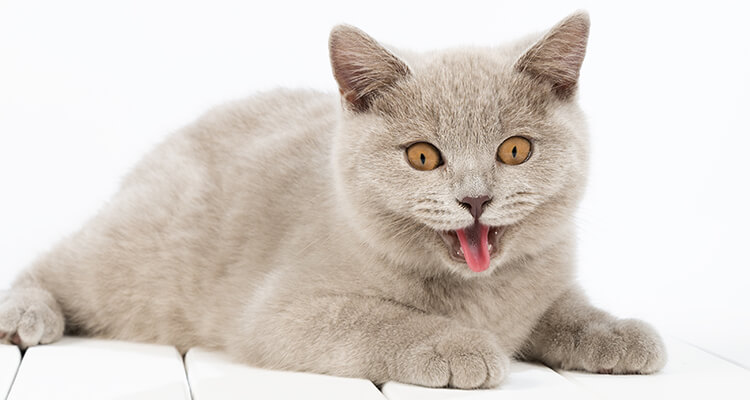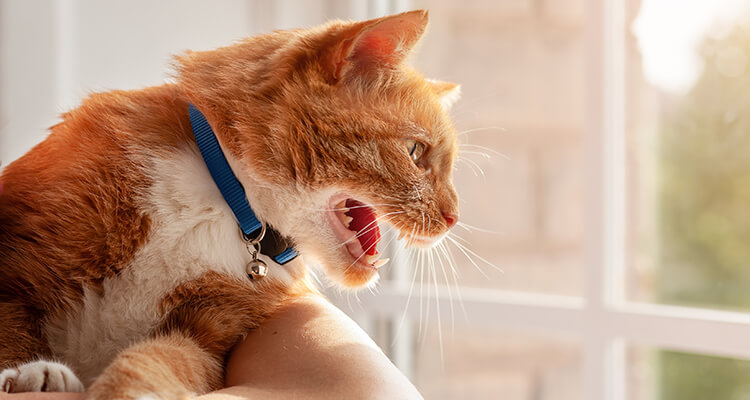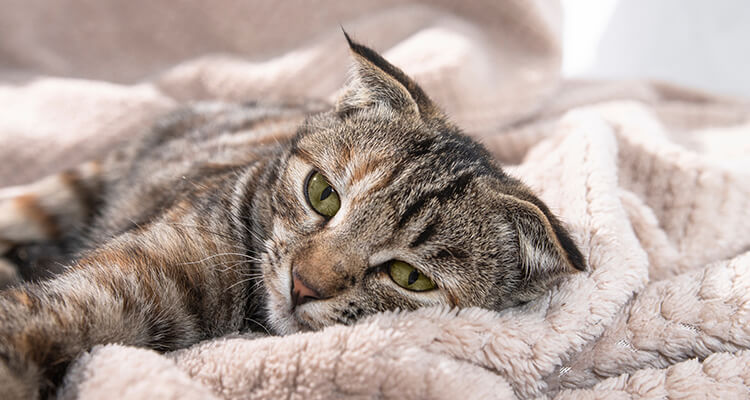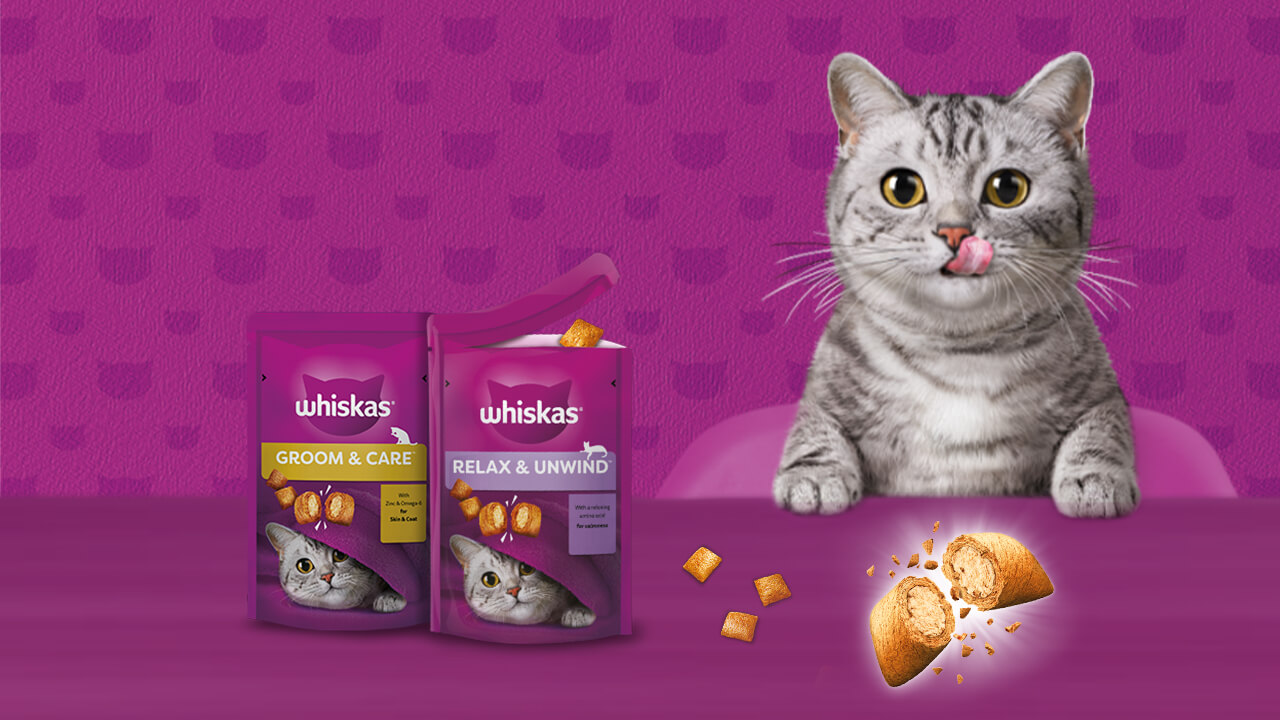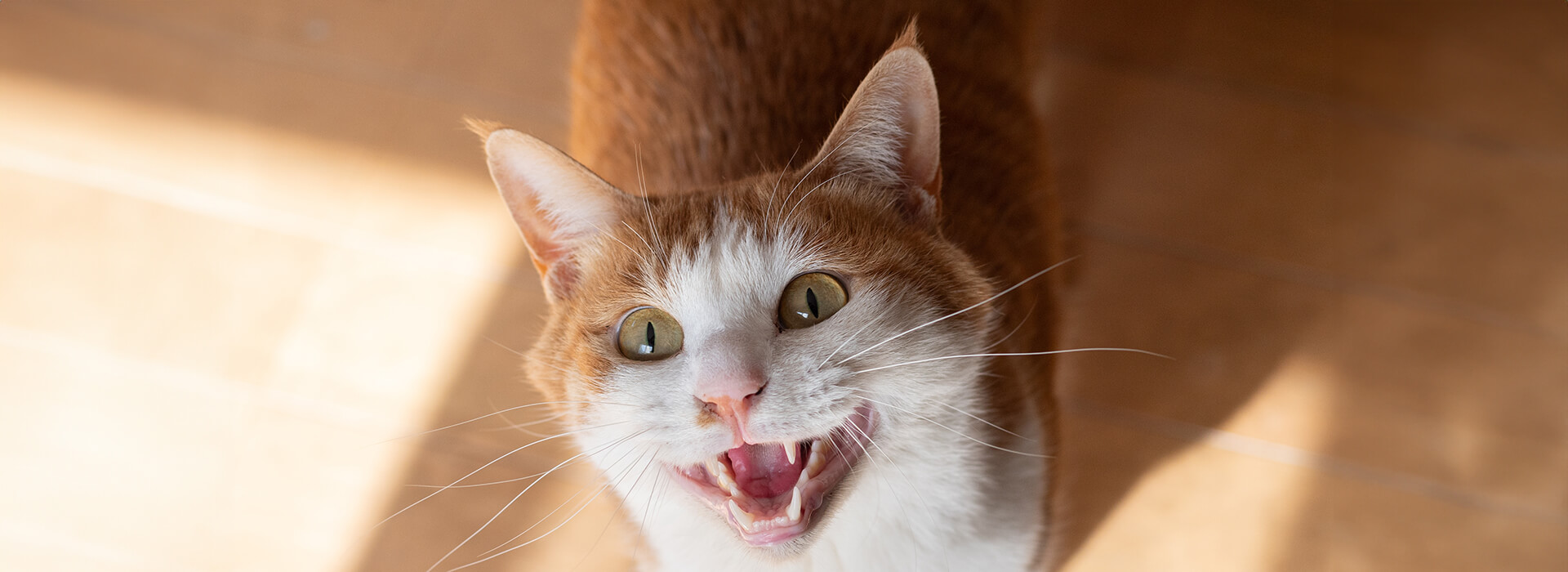
Why does my cat meow so much? Cats are known and loved for their unique meows and they exclusively meow to communicate with their owners or gain attention. Cats have a wide range of vocalisations alongside meowing, so it is important to distinguish between meowing, hissing, purring and yowling. Cats hiss to show they are feeling threatened, they generally purr to communicate they are content and they yowl when they are in pain, feeling territorial or in heat. You can find out more about different vocalisations and their meanings on our cat care hub. It is important to observe the cat's behaviour with each vocalisation, this will help you understand the meaning of their noises.
There are a multitude of reasons why your cat may be meowing, however, the most common reasons are that your cat is greeting you, they are hungry, they are bored, they have an urgent demand, they are thirsty or they are requesting to go outside! Sometimes it can be tricky to ascertain exactly what your cat is asking for, so making sure that all these basic needs are fulfilled will help you narrow down their requests. Generally, the longer and more drawn out the meow, the more urgent the demand, compared to a short mew when they see you, which is almost certainly your cat's way of saying “hello”! It is important to note that certain cat breeds may be more inclined to meow more frequently such as oriental breeds (breeds developed from and closely related to the Siamese cat), however, excessive meowing should not be ignored. If your cat is constantly meowing there may be an underlying issue they are trying to make you aware of. This article will help you figure out when meowing is excessive and what it could mean.
What qualifies as excessive vocalisation?
Why does my cat keep meowing? Cats are unique animals and they all vocalise differently with varying frequencies! However, if you find that your cat is constantly meowing it could be a sign of an underlying issue that you need to investigate. For example, you may find that your cat is meowing in the middle of the night when there isn't an obvious need to communicate, this could be a sign that something else may be going on. Quantifying “excessive meowing” can be difficult, especially if you have a chatty cat! This is why observing the situation, behaviour and body language of your cat can help us best understand the meaning of the vocalisation. We advise that meowing qualifies as excessive when: it’s disrupting your daily life or causing you emotional distress.
5 Common causes of excessive meowing
Cats meow to communicate various needs like hunger, attention, or stress, and observing context and body language, or consulting a vet, helps understand why. Meowing is a normal feline behaviour and it is one of many different types of cat vocalisations. However, if your cat is constantly meowing it should be investigated further.
Your Cat Wants Your Attention
Wondering why your cat is meowing so much all of a sudden? Excessive meowing could simply be your cat's way of calling you or trying to locate you within the home. It could also be your cat's way of telling you they are feeling bored or lonely and want your attention! Have you spent some quality time with them lately? We suggest engaging in some dedicated playtime with their favourite toy. Alternatively chatting away to them and/or a good scratch behind the ear or at the base of their tail may suffice, whatever they prefer! These meows may be shorter but persistent. These meows may also be accompanied by your pet staring you down too!
Your Cat Is Making a Request
Has your cat been fed recently or have they been left in the wrong room or outside for too long? Your cat may be trying to let you know that they are hungry or that they are trying to get out of a room or back into the house! These meows tend to be longer and more drawn out and may sound urgent.
Your Cat Wants to Breed
Why does my cat keep meowing so loudly and constantly at the windows or at night? When female cats haven't been spayed they become very vocal, howling loudly and constantly to catch the attention of a potential mate. Similarly, when male cats who haven't been neutered smell female cats in heat they may also excessively meow to attract their attention from up to a mile away. Spaying or neutering your pet is always advised to avoid these unwanted behaviours which can be stressful for you and your pet.
Your Cat is Stressed
Excessive meowing may also be a sign that your cat is upset about recent changes in your home. Cats are very sensitive to any changes in their territory and enjoy a set routine. Have you introduced a new family member or pet to the home? This could be a possible trigger. Other triggers include moving house, not enough litter trays, not enough territory for your cat in your home, nearby construction or other visitors to your home. Take note of any recent changes in your home as identifying and alleviating stressors is the best way to combat this kind of excessive meowing. Feline pheromone diffusers can help ease stressful situations for cats.
Something is Medically Wrong
If you have tried to resolve all the issues mentioned above and your cat is still constantly meowing it is time to consult your vet to check the health of your pet. Your vet will make sure no underlying conditions or pain is causing them to meow excessively.
The effects of old age
None of these issues seem to be affecting my older pet, so why is my cat meowing so much all of a sudden?
As cats grow older they can also become more vocal and chatty, unfortunately, this is largely due to mental and cognitive decline. Just like humans, senior cats can experience vision or hearing loss as they grow older, accompanied by forgetfulness. This means that your pet is more likely to meow for help, attention, food or to locate where you are if they can't see or hear well. They may also yowl or meow when they are struggling to do something due to their old age. It is important to be aware of what changes your cat is experiencing as they grow older so you can be more empathetic and understand their needs better, as they may need a little more help with things than they did before!
How to reduce vocalisation
The best way to reduce excess vocalisation in cats is to understand what they are trying to tell you and then aim to meet their needs in the most natural way possible! It can be confusing trying to understand exactly what your pet is trying to tell you without words, however, the following suggestions include common home remedies and actions that will help you narrow down which culprit is stressing your cat out.
- Cats need a consistent and defined routine! Changes to their routine and the absence of a set routine can be upsetting for them.
- Cats could also be meowing constantly due to loneliness. Make sure to spend some quality time with your pet. You can sit and groom them, pet them, play a game with them and chat to your cat to alleviate loneliness! Most cats love some one on one attention.
- If you can, keeping your cat away from windows at night can be helpful if their excessive meowing is triggered by cats outside. This may be happening due to territorial reasons or because your cat is in heat or other cats in the area are.
- Access to the outdoors during the daytime is another great way to help keep your pet entertained and stimulated for hours. This outdoor activity could involve other animals too.
- Make sure your cat has regular meal times and access to fresh water, especially before bedtime. A cat water fountain can help ensure your cat always has access to fresh running water. Feeding your cat before bed also ensures they won't try and wake you up with any hungry meows! By feeding your cat wet food twice a day (morning and night) and making dry food available to graze on throughout the day, you can help your cat mimic their natural instincts to eat several small meals a day.
If you have already tried these suggestions and are not seeing any noticeable improvements, you must consult your veterinarian to check your pet's overall health.
What not to do to reduce meowing
Along with do’s there are always some don’ts!
Don't ignore it!
- As common as cat meows are, if you suspect your cat is excessively meowing you shouldn't ignore it. Even if you don't need to make a trip to the vet, excessive meowing is a cat's way of telling you something and it is your responsibility as an owner to find out what is going on with your pet.
Don’t punish a cat for excessive meowing, remember, meowing is their primary method of communicating with us!
- Why does my cat keep meowing? Punishing your cat for meowing excessively will make the problem even worse. Punishing a cat will also create distrust between the cat and its owner, causing even more stress. Your pet will not understand why you are punishing them.
Don’t give in!
- Utilise positive reinforcement by rewarding quiet behaviour with your cat’s favourite treats. Ignoring meowing that appears to be for attention may also help. Try chatting back to them, they'll enjoy the interaction!
If you are dealing with excessive meowing in a senior cat it's always beneficial to create stress-free environments where your pet feels super comfortable and at home. This will benefit their overall health and happiness as well as reduce any excess meowing.
Your pet is growing older and it's perfectly normal to expect that they may need some more help and attention than they did before.


